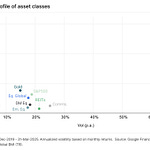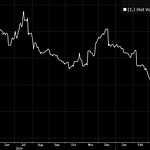To investors,
Asset prices have been drawing down in every market over the last few months. You can see it in stocks, bonds, real estate, commodities, and crypto. There have been numerous people warning business owners and founders of technology startups to prepare for a tough economic environment.
This usually entails cutting costs, taking on outside investment, and focusing on profitability. The average small business is well prepared for these situations because profitability is the name of the game in good times or bad times. Technology startups have a different approach, which usually allows them to lose money for a period of time before they find product-market fit and profitability.
So the technology companies are the ones who will have a tough time over the next few months if they can’t get access to new investment. But as the saying goes, beggars can’t be choosers. Raising new capital during a market downturn can be excruciatingly painful. There is heavy dilution and unfavorable terms. Venture capitalists are price makers and founders are price takers.
This isn’t the only path though.
With the recent rise in subscription revenue products, both consumer and enterprise, there has been the creation of a new financing option for founders as well. Pipe, and other companies like them, allow founders to access non-dilutive capital by using their recurring revenue as an asset. I am not an investor in the company, but I am friends with the founder Harry Hurst and have been working with Pipe on the podcast for awhile now.
I asked the company to put together an overview of how founders can access this non-dilutive funding during these severe market downturns. Here is that overview:
2022 has started out to be a wild year for founders and business owners. From the Fed raising interest rates and possibly planning to raise them again, to economists talking about impending recession, to valuations shrinking and VCs cutting back on deployment, the funding environment is very different than where we were just a year ago. But even with all that change taking place, there are some great opportunities for companies to grow if they can access the financing they need to make it happen. Alternative finance may just have the answer for that.
What you can’t control
When the growth of your company depends on external financing, all the above factors can be massively disruptive. They can lead to paying a much higher interest rate than you otherwise would, raising a down round where you give up too much equity for too little capital, or even putting growth on hold because you’re not able to access capital at all.
All those environmental factors are outside your control. For example, while you can work harder to convince VCs of your company's value, you can’t change the overall climate of valuations in your industry or the wariness of VCs to part with cash right now. It’s an uphill battle at best. But there is one factor you can control—and one which you work to control each and every day as part of running a company—your revenue.
What you can control
If your business is healthy and generating predictable revenue, you’re in a very good position to grow, especially if that revenue is recurring. Recurring revenue models like subscriptions and memberships are becoming more popular across almost every industry because they give customers convenience and they give companies predictable revenue streams. In fact, these streams are so reliable that they’ve become an asset class in their own right. And that asset class is the foundation of a new financing model—recurring revenue financing.
What is recurring revenue financing
Recurring revenue financing (RRF) capitalizes on the health of your business and the predictability of your recurring revenue assets. It allows you to trade your revenue streams for up-front capital so you can grow faster. To see how this works, let's talk about what recurring revenue financing is NOT.
It’s not a loan. Loans involve borrowing money and repaying with interest, often using your assets as collateral. Instead of borrowing, recurring revenue financing (like what we offer on the Pipe platform) is actually the sale of future revenue for cash up front (at a slight discount). Investors love the steady, fixed-income-like returns, which helps keep the discounts low. Pipe uses a two-sided trading platform, so institutional investors actually bid on your anonymized revenue, which keeps the costs even lower.
It’s not dilutive equity financing. When you trade your revenue streams, you’re trading just that—the revenue. You maintain complete control of your company and never dilute your equity. This also means the amount of financing you can access isn’t limited by valuations because investors aren’t buying a piece of the company. Your trading limits are based on the health of your business and the amount of recurring revenue you have, so you can trade more as your business continues to grow. And if you are looking to raise an equity round in the future, you can use recurring revenue financing to grow your business and your valuation and extend your runway until conditions are right for you to raise the round you really want.
When is recurring revenue financing right for you?
Equity and debt financing both have their place. Banks and VCs are all focused on making the kinds of investments that are right for them, which may not always be right for you. If you’re pre-revenue and trying to turn a great idea into a viable business, a VC who focuses on your industry and believes in your vision is probably going to be the best fit. If you have good revenue and cash flow but don’t have recurring revenue, some sort of loan product might be the right fit.
While equity and debt financing can work at the right time, they’re not always a good idea. Many VCs and lenders work only with specific industries, and both are tied directly to the current market conditions, as we’ve already discussed. For healthy businesses with recurring revenue—and I mean any type of recurring revenue, not just SaaS (D2C, service businesses, real estate, insurance, etc.—trading that revenue can be the perfect hedge against an unpredictable market. Regardless of what central banks do, you can finance your growth based solely on your business’s health. And regardless of what valuations look like or how VCs are deploying capital, you can access the cash you need to keep growing and investing in hiring, marketing, geo expansion, or whatever path you see fit to scale your business.
And right now Pomp readers can get trade fees waived for 12 months via pipe.com/pomp
Every company is going to have to prepare for the market downturn. Maybe it comes or maybe it doesn’t. Maybe it as severe as some are predicting or maybe it isn’t. Either way, you need to understand the options available. Hopefully this is helpful to a few of you who are spending your time, money, and energy trying to build solutions to our hardest problems. Keep going. We all need you to succeed.
Talk to everyone tomorrow.
-Pomp
THE RUNDOWN:
A16z Addresses Downturn in Inaugural State of Crypto Report: Noted venture capital firm Andreessen Horowitz has released its inaugural State of Crypto report that includes cyclical information relevant to the current downturn, according to draft materials provided to CoinDesk. Other key takeaways were related to Web 3 benefits and Ethereum’s continued blockchain dominance. Read more.
Coinbase Pares Back Hiring Plans Amid Weak Earnings, Poor Market Condition: Crypto exchange Coinbase (COIN) will slow down hiring and reassess headcount needs as the broader crypto market sees a downturn, the firm said in a note to employees. “We’re slowing hiring so we can reprioritize our hiring needs against our highest-priority business goals,” said Emilie Choi, president and chief operating officer at Coinbase, in the note. Read more.
Elon Musk Says Twitter Deal ‘Cannot Move Forward’ Until He Has Clarity on Bot Numbers: Elon Musk said his $44 billion purchase of Twitter will not move ahead until he has more clarity on how many accounts are fake. Twitter estimated in a filing earlier this month that fewer than 5% of its monetizable daily active users — known as mDAUs — during the first quarter were bots or spam accounts. But Musk estimates that around 20% of the accounts on Twitter are fake or spam accounts and he’s concerned that the number could be even higher. Read more.
S&P Global Ratings Forms DeFi Group to Build Out Crypto Framework: S&P Global’s ratings division has created a Decentralized Finance strategy group to help build the company’s decentralized market framework for investors. Chuck Mounts will lead the group as chief DeFi officer, and will work closely with the newly-appointed head of DeFi transformation, Charles Jansen, according to a statement Monday. The team seeks to build out S&P’s analytics and risk assessment capabilities for both traditional finance and DeFi clients. Read more.
Ric Edelman is the author of the new book "The Truth About Crypto" and is the #1 Independent Financial Advisor in the country.
In this conversation, we talk about the macro environment, Bitcoin, why Ric pivoted to focus on Crypto, the role of Cryptocurrencies in an individual's portfolio, and why the invention of the Blockchain is one of the greatest human inventions of all time.
Listen on iTunes: Click here
Listen on Spotify: Click here
Bitcoin On-Chain Breakdown From This Past Week:
Podcast Sponsors
These companies make the podcast possible, so go check them out and thank them for their support!
Fundrise is largest direct-to-investor real estate investment platform. Go to Fundrise.com/Pomp today and get $10 when you place your first investment.
Unstoppable Domains’ 10 NFT domain endings are now fully integrated with Trust Wallet. Claim your Unstoppable Domain here today.
Brave Wallet is the first secure crypto wallet built natively in a web3 crypto browser. Download the Brave privacy browser at brave.com/Pomp today.
BetOnline allows you to use Bitcoin and other altcoins to bet on sports, casino games, horse racing, poker and more. Click here and use PROMO CODE: POMP100 to receive a 100% matching bonus on your first crypto deposit.
Abra lets you trade, borrow, and earn interest on crypto. Earn up to 13% interest on USD stablecoins or crypto, borrow USD stablecoins, and trade in 110+ cryptocurrencies in a simple, secure app. Download Abra and get $15 in free crypto when you fund your account.
FTX US is the safe, regulated way to buy digital assets. Trade crypto with up to 85% lower fees than top competitors by signing up at FTX.US today.
Compass Mining is the world's first online marketplace for bitcoin mining hardware and hosting. Visit compassmining.io to start mining bitcoin today!
Choice is rebuilding the way bitcoiners approach retirement by making it possible to invest in digital assets inside your IRA. Visit choiceapp.io/pomp
BlockFi provides financial products for crypto investors. Those products include BlockFi Wallet, no fee Trading, crypto collateralized Loans and the World's First Crypto Rewards Credit Card. To get $75 back on the first swipe of your BlockFi Rewards Credit Card, sign up today at http://www.blockfi.com/Pompcc
LMAX Digital is the market-leading solution for institutional crypto trading & custodial services. Learn more at LMAXdigital.com/pomp
Okcoin is the first licensed exchange to bring new cryptos to market. To get started, and go to okcoin.com/pomp
Exodus is the world’s leading desktop, mobile, and hardware crypto wallets, with over 150 assets. Founded in 2015 to empower people to control their wealth. Visit http://exodus.com/pomp today.
You are receiving The Pomp Letter because you either signed up or you attended one of the events that I spoke at. Feel free to unsubscribe if you aren’t finding this valuable. Nothing in this email is intended to serve as financial advice. Do your own research.














Share this post